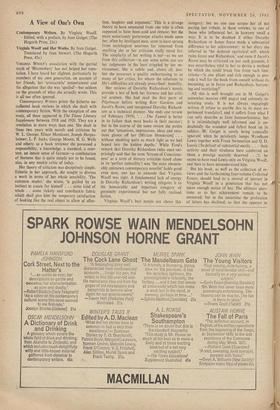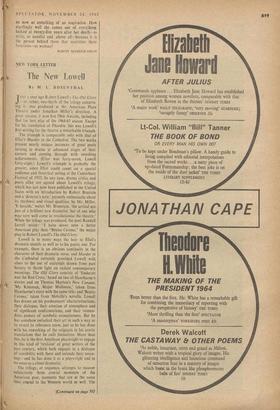A View of One's Own
• Hogarth Press, 21s.)
VIRGINIA WOOLF'S association with the partial myth of 'Bloomsbury' has not helped her repu- tation. I have heard her slighted, particularly by members of my own generation, on account of her friends, her 'aristocratic' temperament and the allegation that she was `spoiled'—but seldom on the grounds of what she actually wrote. This is all too often ignored.
Contemporary Writers prints the hitherto un- collected book reviews in which she dealt with contemporary fiction. With the exception of one essay, all these appeared in The Times Literary Supplement between 1918 and 1920. They are a revelation in more ways than one. She dealt in these two years with novels and criticism by W. L. George, Elinor Mordaunt, Joseph Herges- heimer, L. P. Jacks, George Moore, H. G. Wells and others; as a book reviewer she possessed a responsibility, a knowledge, a standard, a cour- tesy, an innate sense of fairness—a combination of features that is quite simply not to be found, alas, in any weekly critic of today.
Her theory of criticism was deceptively simple. Eclectic in her approach, she sought to discuss a work in terms of her whole sensibility. The common reader,' she wrote, 'is guided by an instinct to create for himself . . . some kind of whole . . .some rickety and ramshackle fabric which shall give him the temporary satisfaction of looking like the real object to allow of affec- tion, laughter and argument.' This is a strange theory to have emanated from one who is often supposed to have been cold and remote; but the more notoriously guttersnipe attacks made upon her, often by intelligent men, seem to have sprung from sociological neuroses far removed from anything she or her criticism really stood for. The simplicity of her writing is not—as we see from this collection—in any sense naïve, nor are her judgments in the least crippled by her en- vironment. She is subtle and, above all, just; but she possesses a quality embarrassing to so many of her critics, for whom the solutions to life's difficulties are already prescribed: humility.
Her reviews of Dorothy Richardson's novels provide a test of both her fairness and her criti- cal acumen. She had read the first parts of Pilgrimage before writing Kew Gardens and Jacob's Room, and recognised Dorothy Richard- son as a technical pioneer. She ends one revie* (of February 1919), . . The Tunnel is better in its failure than most books in their success'; but in the course of the same review she points out that 'sensations, impressions, ideas and emo- tions glance off her [Miriam• Henderson] . . without shedding quite as much light as we had hoped into the hidden depths.' While Ford's remark that Dorothy Richardson (who once sur- prisingly said that the term 'Stream of Conscious- ness' as a term of literary criticism stood alone in its 'perfect imbecility') was 'the most abomin- ably unknown contemporary novelist' holds good even now, one has to concede that Virginia Woolf was right. A fundamental lack of energy in Dorothy Richardson's writing relegates it to the honourable and important category of genuinely experimental but not fully realised fiction..
Virginia Woolf's best novels are above this
category; but no one can accuse her of not paying just tribute, in these reviews, to one of those who influenced her, in however small a way. It is to be doubted if either Dorothy Richardson or James Joyce made a substantial difference to her achievement: in her diary she referred to 'the damned egotistical self; which ruins Joyce and Richardson,' and even if Jacob's Room may be criticised on just such grounds, it was nevertheless vital to her to devise a method by which she could break free from such limi- tations—'is one pliant and rich enough to pro- vide a wall for the book from oneself without its becoming, as in Joyce and Richardson, harrow- ing and restricting?'
All this is well brought out in M. Guiget's somewhat massive (488 pages) and solemnly in- teresting study. It is not always engagingly written (I refuse to ascribe this to its most ex- perienced translator)', and it suffers from what I can only describe as faint humourlessness; but it is intimidatingly well informed and is un- doubtedly the soundest and fullest book on its subject. M. Guiget is surely being comically ignorant when he petulantly lumps Wyndham Lewis together with Frank Swinnerton and Q. D. Leavis ('In default of substantial merits . . . their activity and their virulence have conferred on them a prestige scarcely deserved . . .'): he seems to have read Lewis only on Virginia Woolf, and then to have misunderstood him.
But his book, as well as the collection of re- views and the forthcoming four-volume Collected Essays, should lead to a revival of interest in Virginia Woolf in a generation that has not taken enough notice of her. The ultimate ques- tions as to her achievement remain to be answered; but in the meantime the profession of letters has declined, so that she appears to
us now as something of an inspiration. How startlingly well she comes out of everything, looked at twenty-five years after her death—as critic, as novelist and, above all—because it is the person behind them that nourishes these functions—as woman !
MARTIN SEYMOUR-SMI I II



















































 Previous page
Previous page